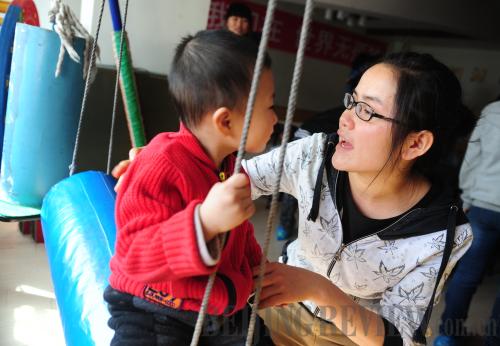|
 |
|
LOVE GIVING: Li Mei, a worker with an NGO dedicated to helping autistic children in Lanzhou, northwest China's Gansu Province, plays with a kid with the developmental disorder on March 28 (NIE JIANJIANG) |
Non-government organizations (NGOs) will encounter less red tape while providing public services in China. On March 10, the State Council, China's cabinet, announced its decision to loosen registration requirements for NGOs as part of sweeping reforms to place rational limits on government intervention in civil affairs.
Industrial associations, chambers of commerce, charities, community service organizations, and organizations involved in science and technology fields can directly register with civil affairs authorities without prior examination or approval, said Ma Kai, then Secretary General of the State Council, when unveiling a plan on the State Council's institutional reform and transformation of government functions to this year's session of the National People's Congress (NPC), the country's top legislature.
But the establishment of a social organization regarding politics, legal issues and religion is still subject to prior government examination and approval, as are overseas NGOs applying to open representative offices in China, according to the plan.
The plan acknowledged that the requirements for establishing social organizations are too high, and even some NGOs tend to operate in a bureaucratic way like government departments.
"The current management mechanism is no longer suitable for the standardized development of social organizations," Ma said.
In the plan, the State Council pledged to let social organizations play a greater role in managing social issues.
On March 14, the NPC adopted the State Council's plan.
Bigger society
This new effort to remove entry barriers for NGOs is part of the State Council's "bigger society, smaller government" initiative.
Previously, an NGO had to find a government department or agency to be its supervisory body before it could legally register, according to the 1998 Regulation on Registration and Administration of Social Organizations.
According to the reform plan, the State Council will separate industrial associations and chambers of commerce from administrative departments, as well as introduce a competitive mechanism featuring multiple associations for a single industry, which is believed to boost their independence and vitality.
Priority will be given to the establishment of social organizations in the fields of commerce and science and technology, and those related to public interests and charitable and rural-urban community services, the plan said.
"There is huge potential for NGOs to supplement the government in public services," said Xue Lan, Dean of the School of Public Policy and Management at Tsinghua University.
The government should set rules and act as a judge rather than a player and judge at the same time, according to Xue.
"Previously, the government required NGOs to first have a supervisory organization out of concern that civil affairs authorities were not capable of managing these highly diverse organizations," said Deng Guosheng, a Tsinghua University professor studying NGOs. "However, this requirement had become a bottleneck hindering the development of NGOs."
Many government departments are reluctant to shoulder the responsibility as the supervising agency of NGOs. As a result, many non-public charitable organizations have registered as corporations or operated without registration.
Beijing Stars and Rain, founded in 1993, is dedicated to helping autistic children in China. Data on its website show that it has helped over 6,000 autistic children and their families through unique parent-training courses. Despite the achievements, it couldn't go through the NGO registration procedure because it failed to find a supervisor meeting government requirements.
More than 3 million NGOs in China are not officially recognized, estimated Yu Keping, Director of the Center for Chinese Government Innovations at Peking University and Deputy Director of the Central Compilation and Translation Bureau, a leading think tank of the ruling Communist Party of China.
| 